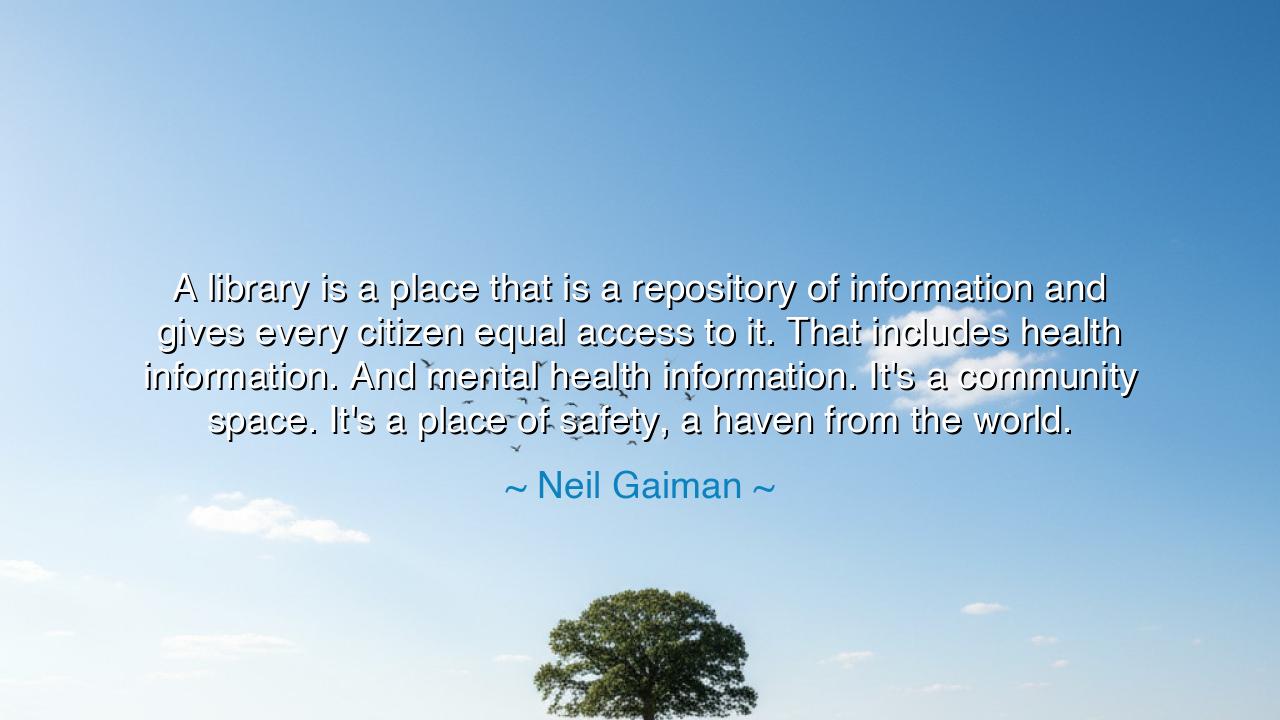
A library is a place that is a repository of information and
A library is a place that is a repository of information and gives every citizen equal access to it. That includes health information. And mental health information. It's a community space. It's a place of safety, a haven from the world.






The storyteller and guardian of imagination, Neil Gaiman, once spoke these luminous words: “A library is a place that is a repository of information and gives every citizen equal access to it. That includes health information. And mental health information. It's a community space. It's a place of safety, a haven from the world.” In this reflection, Gaiman reminds us that a library is not merely a building filled with books, but a temple of knowledge, a sanctuary of truth, and a refuge for the spirit. His words are both gentle and profound, echoing the wisdom of the ancients who knew that the preservation and sharing of knowledge was the foundation of civilization itself.
In the earliest days of human learning, the great libraries of the world—Alexandria, Pergamon, Nalanda, and countless others—were more than archives of scrolls; they were living hearts of their societies. There, scholars, healers, philosophers, and travelers came together to seek understanding, to share discoveries, and to contemplate the mysteries of life. To step into such a place was to step into the collective memory of humankind. Gaiman’s words rekindle this ancient spirit, reminding us that a library remains one of the few spaces in the modern world where every person—rich or poor, young or old—may come as an equal, united in curiosity and protected by knowledge.
When Gaiman speaks of equal access, he evokes the very essence of democracy—the belief that knowledge should not belong to a few, but to all. For ignorance, as the ancients taught, is the mother of tyranny. To withhold knowledge is to chain the mind; to share it is to free the soul. A library, then, is not only a repository of books—it is an act of resistance against darkness. It ensures that the wisdom of the world is never confined to palaces or private towers, but open to every wanderer who seeks light. The philosopher Epictetus, born a slave, once said that freedom comes through learning. And so it is that the library—open and welcoming—becomes the gateway to liberation for all.
Gaiman goes further, reminding us that within these walls lies not just knowledge of the mind, but healing for the heart. To include health information and mental health information is to recognize that wisdom must serve the whole person—the body, the mind, and the spirit. In ancient Greece, the Asclepions—temples of healing—were built beside theaters and libraries, for the healers understood that medicine alone could not cure without understanding. The mind, nourished by story and knowledge, was as vital as the body’s strength. So too, in a library, one may find not only instruction but solace; not only learning but restoration.
It was said that when the Library of Alexandria burned, the scholars of the world wept as though a piece of their souls had perished. Yet, from its ashes, the idea of the library endured, reborn in monasteries, universities, and public halls. In our time, Gaiman’s vision of the library as a place of safety, a haven from the world, carries that same sacred purpose. In a society often overwhelmed by noise, division, and haste, the library stands as an island of stillness—a place where one may think, reflect, and rediscover the quiet dignity of being human. It is a sanctuary for the weary and a shelter for the searching.
Consider the story of Andrew Carnegie, the industrialist who, having once been a poor boy who borrowed books wherever he could, devoted his fortune to building over two thousand public libraries across the world. He understood, as Gaiman does, that access to knowledge is access to power—the power to transform one’s life. His libraries gave generations of children and workers the tools to dream beyond their circumstances. In every corner of those libraries burned the same flame of hope: that a book could change a life, and that knowledge could lift an entire people.
Thus, Neil Gaiman’s words are not simply praise—they are a call to reverence and responsibility. The library, he teaches, is not only a house of books but a covenant between the past, the present, and the future. It is the memory of humanity, freely offered to all who seek. Its walls are built not of stone alone, but of trust—that knowledge must be protected, shared, and cherished. And in an age when information floods every device but true wisdom grows scarce, the library remains a sacred reminder of discernment, depth, and connection.
Let this, then, be the lesson: cherish the library, defend it, and return to it often. Enter its doors with humility and leave with strength. Let it be a refuge not only for study but for healing. Within its silence, listen for the voice of all who came before you—the scholars, poets, and dreamers whose words still speak across time. For as long as we keep the library alive—as long as we make it a haven for every soul in need—the flame of knowledge will never die, and the world, no matter how chaotic, will always have a place of light.






AAdministratorAdministrator
Welcome, honored guests. Please leave a comment, we will respond soon